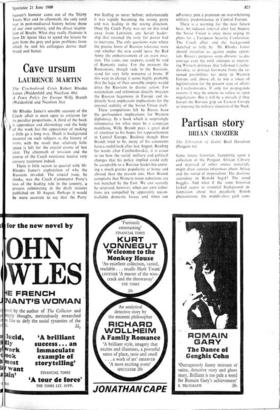Cave ursum
LAURENCE MARTIN
The Czechoslovak Crisis Robert Rhodes James (Weidenfeld and Nicolson 40s) A Peace Policy for Europe Willy Brandt (Weidenfeld and Nicolson 36s) Mr Rhodes James's sensible account of the Czech affair is most open to criticism for its peculiar proportions. A third of the book is appendices and chronology and the body of the work has the appearance of making a little go a long way. Much is background material on such subjects as the history of NATO, with the result that relatively little. space is left for the crucial events of lass year. The aftermath of invasion and the course of the Czech resistance receive very cursory treatment indeed.
There is little reason to quarrel with Mr Rhodes James's explanation of why the Russians invaded. The crucial issue, he thinks, was the Czech Communist Party's loss of the leading role in the country, 4. process culminating in the draft statutes published on 10 August. Perhaps it would be more accurate to say that the Party was leading as never before; unfortunately it was rapidly becoming the wrong party and was leading in the wrong direction. Once the Czech Party was set on this road away from Leninism, any Soviet leader- ship that retained the taste for power had to intervene. The only questions were where the precise limits of Russian tolerance were and whether the KGB could spare the Red Army the embarrassment of an overt inva- sion. The same, one suspects, could be said of Rumania today. For the moment the Rumanians, though rude to the Russians, stand for very little nonsense at home. If this were to change it seems highly probable that the logic of their unstable empire would drive the Russians to drastic action. For nationalism and reformism directly threaten the Russian hegemony in Europe and in- directly have unpleasant implications for the internal stability of the Soviet Union itself.
These compulsions felt by Russia have the profoundest implications for Western diplomacy. In a book which is surprisingly informative for what must be a campaign manifesto, Willy Brandt pays a great deal of attention to his hopes for rapprochement in Central Europe. Realistic though Herr Brandt tried to be, many of his comments have a rueful look after last August. Reading his words after Czechoslovakia, it is easier to see how the social, military and political changes that his policy implied could only be acceptable to a Russian leadership enjoy- ing a much greater popularity at home and abroad than the present one. Herr Brandt complains that Western troop reductions are not matched by the East. We can scarcely be surprised, however, when our own reduc- tions are compelled by apparently uncon- trollable domestic forces and when our adversary puts a premium on overwhelming military predominance in Central Europe.
There is a warning for the near future here. An indecent interval after last August. the Soviet Union is once more urging its plans for a European Security Conference. The Czech affair and the background sketched so fully by Mr Rhodes James should inoculate us against undue optim- ism. Russia's purposes seem obvious: to dis- courage even the mild attempts at improv- ing Western defences that followed Czecho- slovakia, to distract Germany from the re- newed possibilities for unity in Western Europe and, above all, to win a token of legitimisation for the present state of affairs in Czechoslovakia. If only for propaganda reasons it may be unwise to refuse to open negotiations. But it will be a miracle if they loosen the Russian grip on Eastern Europe or improve the military situation of the West.






































 Previous page
Previous page